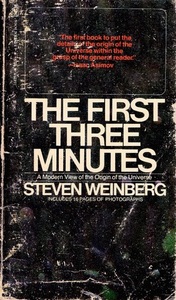Take a photo of a barcode or cover
44 reviews for:
The First Three Minutes: A Modern View of the Origin of fhe Universe
Steven Weinberg
44 reviews for:
The First Three Minutes: A Modern View of the Origin of fhe Universe
Steven Weinberg
It's been a long time since the last read, and I understood so much more this time, even without any more particle physics background. (Quite some distance from my field.) I did wish for a little more scientific detail; I'm starting to be spoiled for popular-level science writing, I guess. This is beautifully, brilliantly clear, and as far as I know the basics of Big Bang nucleosynthesis are still accurate (at this level of detail). I do wish for a full revision, properly integrating inflation and the possibilities of quark-gluon plasma, since the age shows despite the afterword's sketch of "progress since". Unfortunately that would also bring it further from Weinberg's core competencies.
challenging
informative
medium-paced
I decided to re-read this book again after reading a book on dark matter and energy, and wanted to refresh my understanding of the big bang. It is still a very good read, but it is also opening to realize how many things have changed since Weinberg wrote this book less than 30 years ago. It was not known whether the universe will continue to expand indefinitely, or gradually slow down, and therefore there was no notion of dark matter or energy, which we now believe constitutes 96% of the universe. What will the next 30 years bring!
challenging
informative
mysterious
reflective
slow-paced
challenging to understand but rewarding when you do. (definitely had to skip bits though)
Overall, a very thorough and well written overview of the history and major concepts of the field of cosmology. The book does a good job of not only explaining the ideas but also the historically, and physically, relevant information needed to put everything in context. I was hoping this book would be a 'public science' level novel on the field in which I work, and I am not sure it was quite that. Although Weinberg writes in a very approachable way, many of the physical concepts still require (or a very much aided by) having a working understanding of physics, astrophysics, and cosmology. I would treat this book more like a review and historical treatise.
One thing to note, this book was first published in 1977, many years ago from the point of view of the quickly growing and developing field of cosmology. As such, much has been discovered since the book's initial publication. Weinberg treats some of these new discoveries in the Afterword (written about 16 years later and available in the second edition), but several decades have since passed, filled with their own discoveries in cosmology, particle physics and more. This is another reason why I do not recommend this book to anyone unless they already have a good working understanding of the discussed topics, it is quite simply a little outdated. A well written book nonetheless, and a staple for any cosmologists/astrophysicists bookshelf.
One thing to note, this book was first published in 1977, many years ago from the point of view of the quickly growing and developing field of cosmology. As such, much has been discovered since the book's initial publication. Weinberg treats some of these new discoveries in the Afterword (written about 16 years later and available in the second edition), but several decades have since passed, filled with their own discoveries in cosmology, particle physics and more. This is another reason why I do not recommend this book to anyone unless they already have a good working understanding of the discussed topics, it is quite simply a little outdated. A well written book nonetheless, and a staple for any cosmologists/astrophysicists bookshelf.
I've read a lot of books about physics, relativity, elementary particles, the universe, black holes, astronomy, cosmology and the Big Bang theory. Some of them are hard to penetrate. Some of them are written below my level of understanding. This thin volume manages to find the right balance, never really losing me in the process (although it does include the higher maths in an appendix if that's your thing). This book - a long pamphlet really - gives me a much better understanding of the earliest moments of the universe in a way I never had before. It's a much better resolution of vision into the events of the first minute, 3:45, thirty-four minutes of existence. Recommended.
It may have been written 45 years ago, but it is far from inaccurate. It is true that today we know in more detail what has happened since the beginning of the universe, but this book does not dissapoint, it is very precise and elegantly written.
Very complete and technical. Too technical for my level. Definitely want to come back to it later. I counted only one use of an analogy. So really no vulgarisation at all.
Awesome introduction to quantic and relativistic approaches of cosmology. The best for either undergrad students or everyone else just interested in the subject.


